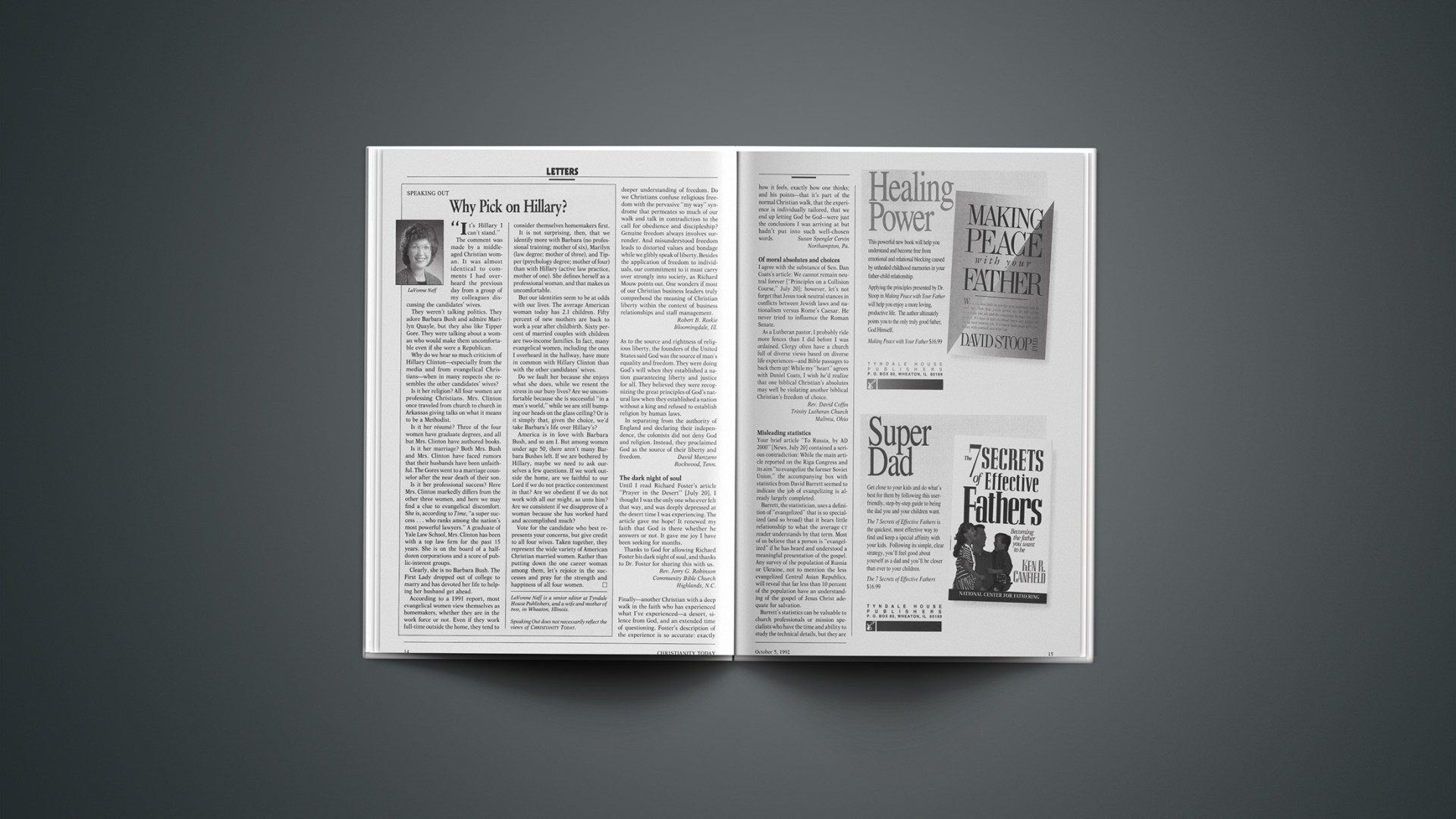“It’s Hillary I can’t stand.” The comment was made by a middle-aged Christian woman. It was almost identical to comments I had overheard the previous day from a group of my colleagues discussing the candidates’ wives.
They weren’t talking politics. They adore Barbara Bush and admire Marilyn Quayle, but they also like Tipper Gore. They were talking about a woman who would make them uncomfortable even if she were a Republican.
Why do we hear so much criticism of Hillary Clinton—especially from the media and from evangelical Christians—when in many respects she resembles the other candidates’ wives?
Is it her religion? All four women are professing Christians. Mrs. Clinton once traveled from church to church in Arkansas giving talks on what it means to be a Methodist.
Is it her résumé? Three of the four women have graduate degrees, and all but Mrs. Clinton have authored books.
Is it her marriage? Both Mrs. Bush and Mrs. Clinton have faced rumors that their husbands have been unfaithful. The Gores went to a marriage counselor after the near death of their son.
Is it her professional success? Here Mrs. Clinton markedly differs from the other three women, and here we may find a clue to evangelical discomfort. She is, according to Time, “a super success … who ranks among the nation’s most powerful lawyers.” A graduate of Yale Law School, Mrs. Clinton has been with a top law firm for the past 15 years. She is on the board of a half-dozen corporations and a score of public-interest groups.
Clearly, she is no Barbara Bush. The First Lady dropped out of college to marry and has devoted her life to helping her husband get ahead.
According to a 1991 report, most evangelical women view themselves as homemakers, whether they are in the work force or not. Even if they work full-time outside the home, they tend to consider themselves homemakers first.
It is not surprising, then, that we identify more with Barbara (no professional training; mother of six), Marilyn (law degree; mother of three), and Tipper (psychology degree; mother of four) than with Hillary (active law practice, mother of one). She defines herself as a professional woman, and that makes us uncomfortable.
But our identities seem to be at odds with our lives. The average American woman today has 2.1 children. Fifty percent of new mothers are back to work a year after childbirth. Sixty percent of married couples with children are two-income families. In fact, many evangelical women, including the ones I overheard in the hallway, have more in common with Hillary Clinton than with the other candidates’ wives.
Do we fault her because she enjoys what she does, while we resent the stress in our busy lives? Are we uncomfortable because she is successful “in a man’s world,” while we are still bumping our heads on the glass ceiling? Or is it simply that, given the choice, we’d take Barbara’s life over Hillary’s?
America is in love with Barbara Bush, and so am I. But among women under age 50, there aren’t many Barbara Bushes left. If we are bothered by Hillary, maybe we need to ask ourselves a few questions. If we work outside the home, are we faithful to our Lord if we do not practice contentment in that? Are we obedient if we do not work with all our might, as unto him? Are we consistent if we disapprove of a woman because she has worked hard and accomplished much?
Vote for the candidate who best represents your concerns, but give credit to all four wives. Taken together, they represent the wide variety of American Christian married women. Rather than putting down the one career woman among them, let’s rejoice in the successes and pray for the strength and happiness of all four women.
LaVonne Neff is a senior editor at Tyndale House Publishers, and a wife and mother of two, in Wheaton, Illinois.
Speaking Out does nto necessarily reflect the views of Christianity Today.










